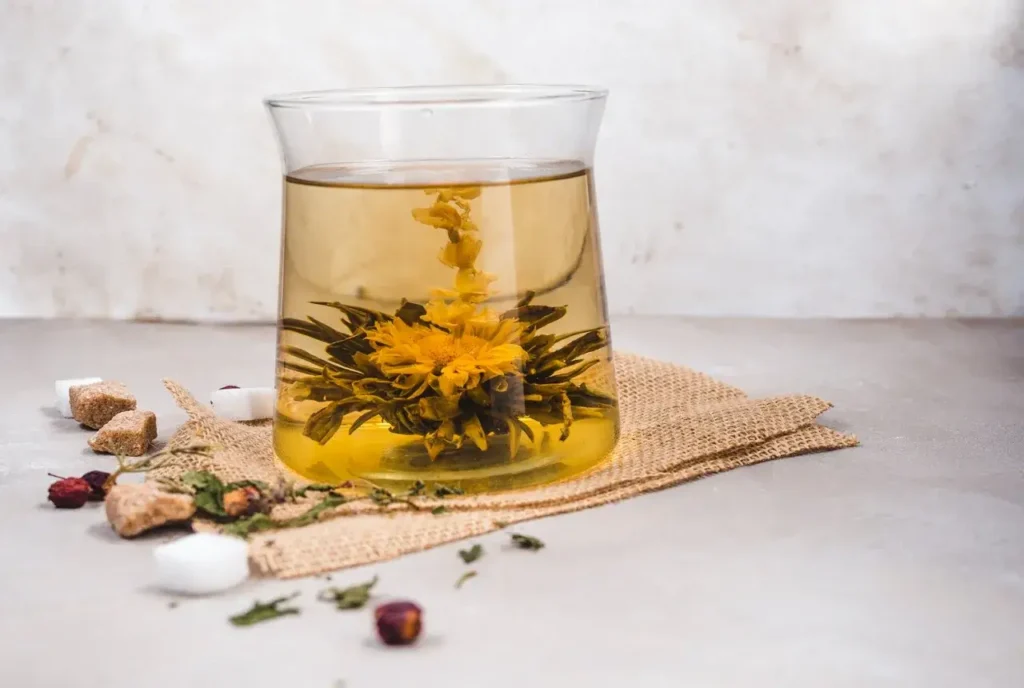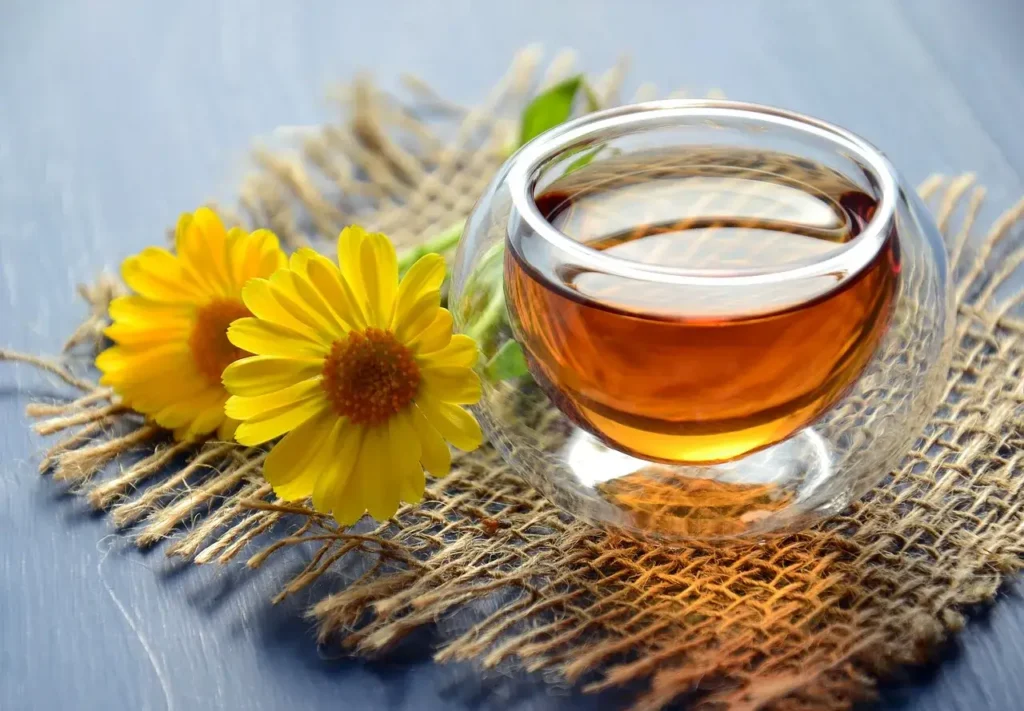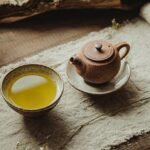Table of Contents
Dandelion tea, made from the leaves, flowers, and roots of the dandelion plant, is a herbal infusion that has been cherished for its various health benefits and unique flavor. This article will delve into the dandelion tea uses, share a simple dandelion tea recipe, and discuss potential dandelion tea side effects.
What is Dandelion Tea?
Dandelion tea is a herbal beverage prepared by steeping the leaves, flowers, or roots of the dandelion plant (Taraxacum officinale) in hot water. While often considered a weed, dandelion has been utilized in traditional medicine for centuries. Its bright yellow flowers, jagged leaves, and robust roots offer a variety of nutrients and compounds that contribute to its health-promoting properties.
In the world of natural health drinks, dandelion tea is rapidly emerging as a powerhouse option that you simply can’t afford to overlook. This herbal tea uses the humble dandelion plant, transforming it into a soothing beverage brimming with health benefits. Why drink dandelion tea? The reasons are compelling.
For starters, dandelion tea benefits extend far beyond its delightful taste. It is packed with vitamins and minerals such as vitamin A, C, and K, along with iron and potassium—nutrients essential for maintaining your overall well-being. Moreover, it’s renowned for its detoxifying properties; it aids in liver function and promotes healthy digestion by acting as a gentle diuretic.
But the advantages don’t stop there. As an anti-inflammatory agent, dandelion tea can help reduce inflammation throughout the body and may even support weight management efforts by improving metabolism and reducing bloating.
Incorporating this herbal marvel into your daily routine is not just about enjoying a warm cup of comfort; it’s about embracing a lifestyle that prioritizes health from within. So next time you’re reaching for a natural health drink, make sure dandelion tea is at the top of your list—it’s more than just an herbal infusion; it’s a step towards better health.
👉 Experience the Premium Dandelion Tea Today! 👈
1. Rich in Nutrients
One of the most compelling dandelion tea uses is its nutrient density. Dandelion leaves are rich in vitamins A, C, K, and B vitamins, along with minerals such as calcium, potassium, and magnesium. The roots and flowers also provide antioxidants that can help combat oxidative stress in the body.
Nutritional Benefits:
- Vitamin A: Supports vision and immune function.
- Vitamin C: Boosts the immune system and promotes skin health.
- Vitamin K: Important for bone health and blood clotting.
2. Aids Digestion
Dandelion tea has long been used as a digestive aid. The bitter compounds in dandelion stimulate the production of bile, which helps in fat digestion and nutrient absorption. This can be especially beneficial for individuals who experience digestive issues or bloating.
Dandelion Tea Recipe for Digestion
- Ingredients:
- 1 tablespoon of dried dandelion leaves or roots
- 2 cups of boiling water
- Honey or lemon (optional for taste)
- Instructions:
- Steep the dried dandelion in boiling water for about 10-15 minutes.
- Strain and enjoy warm. Add honey or lemon for flavor if desired.

3. Supports Liver Health
Another remarkable dandelion tea use is its ability to support liver health. Dandelion is known for its diuretic properties, which may help the liver detoxify and remove waste products. Some studies suggest that dandelion root may protect liver cells from damage.
Benefits for the Liver:
- Helps promote bile production.
- May aid in the detoxification process.
- Supports overall liver function.
4. Enhances Skin Health
Dandelion tea is rich in antioxidants and anti-inflammatory compounds, making it beneficial for skin health. Drinking dandelion tea may help clear up skin conditions such as acne and eczema by reducing inflammation and promoting healthy skin renewal.
Tips for Skin Health:
- Drink dandelion tea regularly for internal benefits.
- Apply cooled dandelion tea topically as a soothing compress for irritated skin.
5. Boosts Immune System
The high vitamin C content in dandelion tea, along with its antioxidant properties, can boost the immune system. Regular consumption may help ward off infections and improve overall health, making it a great addition to your wellness routine.
How to Use Dandelion Tea for Immunity:
- Incorporate dandelion tea into your daily routine, especially during cold and flu season.
- Combine with other immune-boosting herbs like ginger or echinacea for enhanced effects.
6. Aids in Weight Management
Dandelion tea has gained popularity as a weight management tool. Its diuretic properties can help reduce water retention, which may contribute to temporary weight loss. Additionally, the tea can act as an appetite suppressant, helping to control cravings.
Tips for Weight Management:
- Drink dandelion tea before meals to help curb appetite.
- Combine with a balanced diet and regular exercise for optimal results.

7. Supports Blood Sugar Levels & Regulates Blood Pressure
Dandelion tea helps stabilize blood sugar levels due to its bioactive compounds, while its potassium content supports healthy blood pressure by acting as a natural diuretic.
Tips for Blood Sugar & Blood Pressure Management:
- Drink 1-2 cups daily as part of a heart-healthy and blood sugar-balancing diet.
👉 Sip the Best Dandelion Tea for Natural Wellness! 👈
Taraxacum Officinale: A Natural Remedy
Dandelion, scientifically known as Taraxacum officinale, has been used in traditional medicine for centuries. Its ability to support liver health, digestion, and inflammation management makes it a versatile herbal remedy. Modern research also highlights its potential role in managing blood sugar and blood pressure.
Why Choose Taraxacum Officinale Tea?
- It’s caffeine-free and rich in essential nutrients.
- Provides a natural alternative to synthetic medications for mild conditions.
Possible Dandelion Tea Side Effects
While dandelion tea offers numerous health benefits, it’s essential to be aware of potential dandelion tea side effects. Some individuals may experience allergic reactions, particularly those allergic to plants in the Asteraceae family, which includes ragweed and marigolds. Other possible side effects include:
- Digestive Issues: Some people may experience stomach upset, diarrhea, or heartburn.
- Electrolyte Imbalance: Due to its diuretic properties, excessive consumption may lead to dehydration or electrolyte imbalances.
- Drug Interactions: Dandelion may interact with certain medications, including diuretics, anticoagulants, and antibiotics. Always consult with a healthcare professional before incorporating dandelion tea into your routine, especially if you are taking medications.
How to Brew the Perfect Cup of Dandelion Tea for Maximum Benefits
Brewing the perfect cup of dandelion tea is an art that promises not only a delightful taste but also a wealth of health benefits. To achieve this, start with a DIY dandelion tea recipe that emphasizes quality and natural enhancement. First, select organic dandelion roots or leaves, as these are the foundation for a pure and nutrient-rich brew.
Begin by thoroughly washing your chosen roots or leaves to remove any impurities. For those using roots, chop them into small pieces and roast them in the oven at 200°F for about 2 hours until they are dry and fragrant. This roasting process brings out their natural sweetness and depth of flavor.
When it comes to brewing tips, patience is key. Use one tablespoon of roasted root or leaf per cup of water. Bring water to a gentle boil before pouring it over your dandelion pieces in a teapot or infuser. Allow the tea to steep for at least 10 minutes; this ensures maximum extraction of its beneficial compounds.
To enhance flavor naturally, consider adding complementary herbs like mint or chamomile during the steeping process. A dash of honey can also sweeten your cup without overpowering its earthy notes.
By following these steps, you’ll not only master a delicious DIY dandelion tea recipe but also unlock its potential health benefits—making each sip as rewarding as it is refreshing.
👉 Discover Top-Quality Dandelion Tea Now! 👈
Where to Buy and How to Choose Quality Dandelion Tea Products
Buying Guide for Dandelion Root Products
When it comes to purchasing dandelion tea, making informed choices can significantly enhance your experience and ensure you reap the full benefits of this herbal wonder. Here’s a comprehensive buying guide for dandelion root products that will help you choose with confidence.
Firstly, consider the difference between organic and non-organic teas. Organic dandelion tea is grown without synthetic fertilizers or pesticides, which means fewer chemicals in your cup and a more natural taste. Opting for organic not only supports sustainable farming practices but also ensures you’re consuming a purer product.
Trusted Brands for Herbal Teas
Next, seek out trusted brands for herbal teas. Well-established brands often have rigorous quality control processes in place to ensure their products meet high standards. Look for companies with positive reviews and certifications that back up their claims of quality and authenticity.
Finally, pay attention to packaging details when selecting your tea. Freshness is key to flavor and potency, so choose products with airtight packaging that preserve the natural goodness of the dandelion root.
By following these guidelines, you’ll be well-equipped to select high-quality dandelion tea that not only delights your palate but also aligns with your health goals.
Conclusion: Reap the Rewards of Dandelions – Make This Simple Change for a Healthier Lifestyle!
Incorporating dandelions into your daily routine can be a transformative step towards a healthier lifestyle. Often overlooked as mere weeds, these vibrant plants are packed with nutrients and offer a host of health benefits. By making this simple change, you can enhance your diet with vitamins A, C, and K, along with minerals like iron and calcium that are abundant in dandelions.
Beyond their nutritional value, dandelions support digestion and liver health, acting as a natural detoxifier for the body. Whether you choose to add them to salads or brew them into teas, the versatility of dandelions makes them an easy addition to any meal plan.
By embracing the power of dandelions, you’re not only enriching your diet but also taking an active step towards living more sustainably. Harvesting these plants from your own backyard reduces waste and reliance on store-bought greens. So why wait? Start reaping the rewards of dandelions today and make this small yet impactful change for a healthier lifestyle!






![Jasmine Tea vs Green Tea Benefits: Which Gives Better Health Results? [2025] jasmine tea vs green tea benefits](https://www.goteaworld.com/wp-content/uploads/2025/09/jasmine-tea-vs-green-tea-benefits-150x150.webp)






